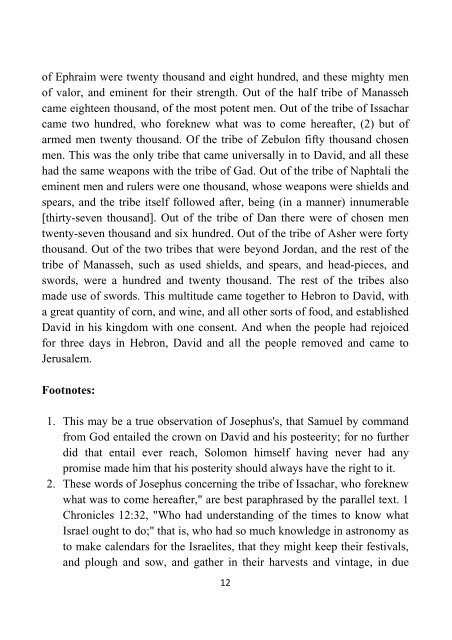Create successful ePaper yourself
Turn your PDF publications into a flip-book with our unique Google optimized e-Paper software.
<strong>of</strong> Ephraim were twenty thousand and eight hundred, and <strong>the</strong>se mighty men<br />
<strong>of</strong> valor, and eminent for <strong>the</strong>ir strength. Out <strong>of</strong> <strong>the</strong> half tribe <strong>of</strong> Manasseh<br />
came eighteen thousand, <strong>of</strong> <strong>the</strong> most potent men. Out <strong>of</strong> <strong>the</strong> tribe <strong>of</strong> Issachar<br />
came two hundred, who foreknew what was <strong>to</strong> come hereafter, (2) but <strong>of</strong><br />
armed men twenty thousand. Of <strong>the</strong> tribe <strong>of</strong> Zebulon fifty thousand chosen<br />
men. This was <strong>the</strong> only tribe that came universally in <strong>to</strong> <strong>David</strong>, and all <strong>the</strong>se<br />
had <strong>the</strong> same weapons with <strong>the</strong> tribe <strong>of</strong> Gad. Out <strong>of</strong> <strong>the</strong> tribe <strong>of</strong> Naphtali <strong>the</strong><br />
eminent men and rulers were one thousand, whose weapons were shields and<br />
spears, and <strong>the</strong> tribe itself followed after, being (in a manner) innumerable<br />
[thirty-seven thousand]. Out <strong>of</strong> <strong>the</strong> tribe <strong>of</strong> Dan <strong>the</strong>re were <strong>of</strong> chosen men<br />
twenty-seven thousand and six hundred. Out <strong>of</strong> <strong>the</strong> tribe <strong>of</strong> Asher were forty<br />
thousand. Out <strong>of</strong> <strong>the</strong> two tribes that were beyond Jordan, and <strong>the</strong> rest <strong>of</strong> <strong>the</strong><br />
tribe <strong>of</strong> Manasseh, such as used shields, and spears, and head-pieces, and<br />
swords, were a hundred and twenty thousand. The rest <strong>of</strong> <strong>the</strong> tribes also<br />
made use <strong>of</strong> swords. This multitude came <strong>to</strong>ge<strong>the</strong>r <strong>to</strong> Hebron <strong>to</strong> <strong>David</strong>, with<br />
a great quantity <strong>of</strong> corn, and wine, and all o<strong>the</strong>r sorts <strong>of</strong> food, and established<br />
<strong>David</strong> in his kingdom with one consent. And when <strong>the</strong> people had rejoiced<br />
for three days in Hebron, <strong>David</strong> and all <strong>the</strong> people removed and came <strong>to</strong><br />
Jerusalem.<br />
Footnotes:<br />
1. This may be a true observation <strong>of</strong> <strong>Josephus</strong>'s, that Samuel by command<br />
from God entailed <strong>the</strong> crown on <strong>David</strong> and his posteerity; for no fur<strong>the</strong>r<br />
did that entail ever reach, Solomon himself having never had any<br />
promise made him that his posterity should always have <strong>the</strong> right <strong>to</strong> it.<br />
2. These words <strong>of</strong> <strong>Josephus</strong> concerning <strong>the</strong> tribe <strong>of</strong> Issachar, who foreknew<br />
what was <strong>to</strong> come hereafter," are best paraphrased by <strong>the</strong> parallel text. 1<br />
Chronicles 12:32, "Who had understanding <strong>of</strong> <strong>the</strong> times <strong>to</strong> know what<br />
Israel ought <strong>to</strong> do;" that is, who had so much knowledge in astronomy as<br />
<strong>to</strong> make calendars for <strong>the</strong> Israelites, that <strong>the</strong>y might keep <strong>the</strong>ir festivals,<br />
and plough and sow, and ga<strong>the</strong>r in <strong>the</strong>ir harvests and vintage, in due<br />
12

















